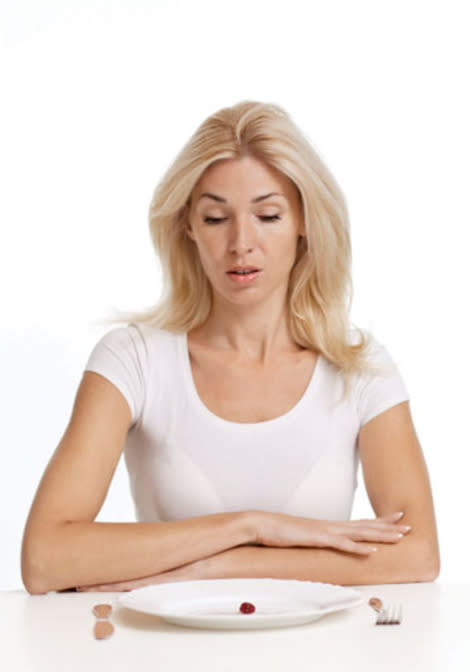8 "Healthy" Diet Tricks that Don't Work

You cleaned out your fridge. You shelled out for new workout clothes. You took the pizza delivery guy off speed dial and (finally) remembered where your pots and pans were hiding. So where the heck are the weight loss results?
The problem is, many of our most dearly held healthy eating rules are far too open to interpretation. Done wrong, that low-carb diet could backfire--or, worse, set you up for a heart attack. And your new, slimmed-down veggie-based meal plan? It might mean you're eating more calories than you were before.
To bust the diet myths that are putting results out of your reach, here, our expert-backed tips.
1. You went gluten-free "just because"
If you go gluten-free and you don't have celiac disease or gluten intolerance, you may be missing out on the host of vital nutrients found in whole grains, such as folate and fiber. "Why skimp on healthy foods if you don't have to?" says Samantha Heller, RD. "Gluten-free does not necessarily mean low-calorie, either." So trade your lunchtime sandwich on wheat for a protein-packed salad a few times a week, but don't cut gluten products altogether unless you have a medical need.
Should You Go Gluten-Free?
2. You swore off sweets
You're eating a heaping plate of rice and veggies. Your friend's chowing down on chocolate cake...and yet you're the one struggling to lose weight? "I tell my patients: You can lose weight eating candy and soda, and gain weight eating brown rice and broccoli," says Heller. Obviously, we aren't recommending a candy-bar diet. New research, while hotly debated, indicates that not all calories are created equal.
"Studies suggest that what we eat matters," Heller says. Bottom line, don't give up the rice and veggies, but make sure you eat a varied diet. Swearing off certain foods only leads you to binge when you do indulge, according to research.
How to Beat Your Sugar Addiction
3. You cut out carbs to speed up weight loss
You might have jumped on the Paleo or Atkins bandwagon after hearing celebs swear by it--but beware the long-term effects. "Low-carb is not maintainable," says Lisa Cashman, RD. "Research suggests it can lead to more weight loss in the first six months, but at one-year mark the results are the same as a more balanced approach." So by all means cut out simple, refined carbs, like store-bought bread, crackers, and even white rice, opting instead for healthy grains that fill you up and digest more slowly, such as quinoa and brown rice in moderation.
7 Surprising Causes of Weight Gain You Can't Control
4. You seriously upped your fiber intake
If you think the solution to feeling lighter is lots of fiber, you're not (exactly) right. "Fiber alone will backfire," Heller says. "You need to increase fluids when you increase fiber." If you don't, expect to feel even more backed up than you originally were. This may not translate to fat gain, but if you're trying to slim down, there's nothing like a bloated belly and backed-up digestion to make you feel less than svelte. "Up fiber slowly," says Heller. "If you don't, you'll irritate the GI tract. If you go slow, your GI tract will smile."
16 Simple Ways to Eat Less
5. You eat micro-portions all day long
You may think less food is more waistline-friendly, but those little bites here and there can seriously add up. Case in point: "Protein and energy bars," says Heller. "They might be fine for an occasional snack, but some of them pack 300 and 400 calories." Problem is, we think of them as an on-the-go snack, when they actually pack enough fat and calories to be considered an entire meal--minus the feeling-full satisfaction of actually having one.
6. You nosh before and after workouts
Unless you're training for a marathon, you don't need food before and after you hit the gym. "Women will work out and then have a 600-calorie smoothie offered at the gym," Heller says. This is a big no-no. Instead, have some lean protein, a few almonds, or a conservative portion of whole grains after a workout--but only if you're truly hungry. "Only eat if you feel like you need it, and make sure to count the calories in your overall total for the day."
Fitness Foods That Make You Gain
7. You still eat low-fat foods
"People still fall for the 'SnackWell Syndrome,'" Heller says, referring to the '90s low-fat snack craze. "They think if it's low-fat then it's low-calorie, which isn't true." The solution? Read the entire label, including the calorie count and other nutritional measurements. And if you want to indulge, do so in moderation. "Women especially don't eat a lot of beans, nuts and nut butters because they think they'll gain weight," Heller says. Put a tablespoon of almond butter or peanut butter on your celery or whole-grain toast. The satisfying sweet kick--plus protein, magnesium, vitamins B and E and fiber--are well worth the calories.
8. You always go for the salad
We hate to break it to you, but just because it's a salad doesn't mean it's healthy. Portions still matter, as do the toppings you add--and most people add a lot. "I see people piling their salads with high-calorie extras like cheese, salad dressing, potato, tuna, croutons, and bacon bits," Heller says. "One ounce of shredded cheddar cheese, plus a half-ounce of sunflower seeds, plus one ounce of tuna, plus two tablespoons of ranch salad dressing is 431 calories." Limit your toppings and pick lean, protein-packed ones, like chickpeas or salmon. As always, oil and vinegar make a nice, simple dressing that doesn't pack on unnecessary fat.
6 Ridiculously Unhealthy Salads
--By Jenna Birch, Prevention
TELL US: What diet rules do you swear by?
More from Prevention.com:
7 Grossest Things in Your Food
The 5 Nutrients Your Diet is Craving
5 Ways Restaurants Trick You

